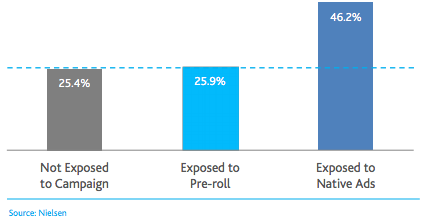A Mexican Wrestler Explains How “Native Ads” Work
“Native ads” is a buzzy but vague term. Here’s an easier way to describe it, at least when it works: “Ads you’d like to see.”
And here’s an example of one of those, via Mexican soft drink Jarritos:
People have been trying to make entertaining ads since the beginning of time. But if you want to add a bit more nuance to the native ads definition, think about them as ads you choose to see.
For example, a new study from Nielsen says that if you clicked on the Jarritos video because you thought it looked interesting, there’s a good chance you’d think positively about the brand that brought you the clip.
But if the ad simply showed up as a 15- or 30-second “pre-roll” ad before a video you were waiting to watch — that is, you didn’t have any choice but to see it — the ad was only marginally more effective than no ad at all.
Here’s what that data looks like in chart form. The figures refer to the percentage of people who had positive feelings about Jarritos:
All of the above is part of the pitch for Sharethrough, a “native ad network” that worked with Nielsen on the research, and which is trying to convince advertisers to let it distribute their ads as “content” on sites across the Web.
But Sharethrough isn’t the only company pushing this idea. YouTube’s take on this is its “TrueView” format, which generally starts out as a pre-roll ad but gives its billion viewers the ability to skip ahead after a few seconds.
Google’s video site only charges advertisers when viewers choose to watch, and it is so heavily invested in the idea that it’s getting pushback from some video creators, who argue that TrueView is cutting down on the ad dollars they see.
As trendy as native ads are, we’re not moving away from intrusive, you-must-watch ads anytime soon. There’s simply way too much apparatus constructed to support that ideology, and it turns out that making stuff people want to see is pretty darn hard. But you can see why advertisers, publishers and investors are all excited about an alternative.










